(肯尼迪就职演说)John F. Kennedy's Inaugural Address
- 格式:pdf
- 大小:70.42 KB
- 文档页数:3
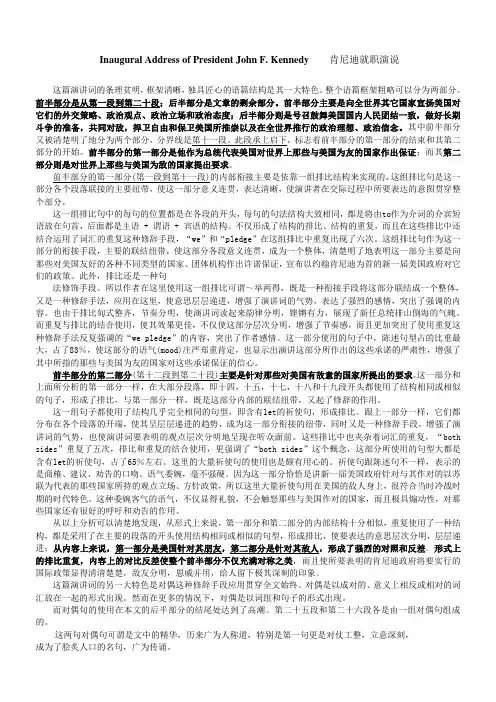
这篇演讲词的条理贫明,框架清晰,独具匠心的语篇结构是其一大特色。
整个语篇框架粗略可以分为两部分。
前半部分是从第一段到第二十段;后半部分是文章的剩余部分。
前半部分主要是向全世界其它国家宣扬美国对它们的外交策略、政治观点、政治立场和政治态度;后半部分则是号召鼓舞美国国内人民团结一致,做好长期斗争的准备,共同对敌,捍卫自由和保卫美国所推崇以及在全世界推行的政治理想、政治信念。
其中前半部分又被清楚明了地分为两个部分,分界线是第十一段。
此段承上启下,标志着前半部分的第一部分的结束和其第二部分的开始。
前半部分的第一部分是他作为总统代表美国对世界上那些与美国为友的国家作出保证;而其第二部分则是对世界上那些与美国为敌的国家提出要求。
前半部分的第一部分(第一段到第十一段)的内部衔接主要是依靠一组排比结构来实现的。
这组排比句是这一部分各个段落联接的主要纽带,使这一部分意义连贯,表达清晰,使演讲者在交际过程中所要表达的意图贯穿整个部分。
这一组排比句中的每句的位置都是在各段的开头,每句的句法结构大致相同,都是将由to作为介词的介宾短语放在句首,后面都是主语 + 谓语 + 宾语的结构。
不仅形成了结构的排比、结构的重复,而且在这些排比中还结合运用了词汇的重复这种修辞手段,“we”和“pledge”在这组排比中重复出现了六次。
这组排比句作为这一部分的衔接手段,主要的联结纽带,使这部分各段意义连贯,成为一个整体,清楚明了地表明这一部分主要是向那些对美国友好的各种不同类型的国家、团体机构作出许诺保证,宣布以约翰肯尼迪为首的新一届美国政府对它们的政策。
此外,排比还是一种句法修饰手段。
所以作者在这里使用这一组排比可谓~举两得,既是一种衔接手段将这部分联结成一个整体,又是一种修辞手法,应用在这里,使意思层层递进,增强了演讲词的气势,表达了强烈的感情,突出了强调的内容。
也由于排比甸式整齐,节奏分明,使演讲词读起来韵律分明,铿锵有力,展现了新任总统排山倒海的气魄。
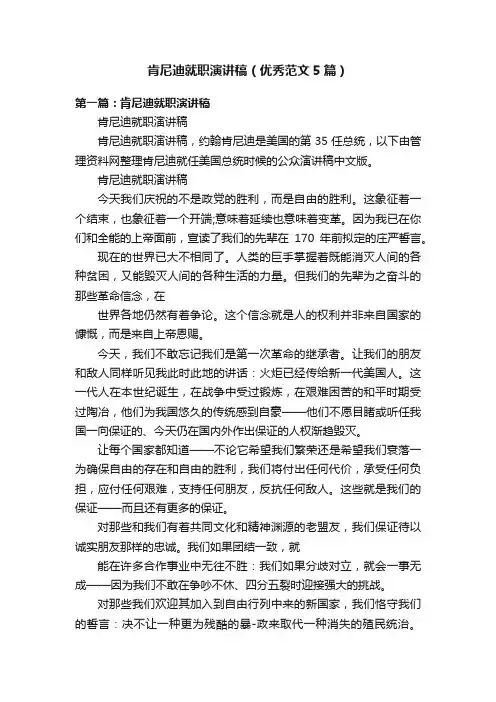
肯尼迪就职演讲稿(优秀范文5篇)第一篇:肯尼迪就职演讲稿肯尼迪就职演讲稿肯尼迪就职演讲稿,约翰肯尼迪是美国的第35任总统,以下由管理资料网整理肯尼迪就任美国总统时候的公众演讲稿中文版。
肯尼迪就职演讲稿今天我们庆祝的不是政党的胜利,而是自由的胜利。
这象征着一个结束,也象征着一个开端;意味着延续也意味着变革。
因为我已在你们和全能的上帝面前,宣读了我们的先辈在170年前拟定的庄严誓言。
现在的世界已大不相同了。
人类的巨手掌握着既能消灭人间的各种贫困,又能毁灭人间的各种生活的力量。
但我们的先辈为之奋斗的那些革命信念,在世界各地仍然有着争论。
这个信念就是人的权利并非来自国家的慷慨,而是来自上帝恩赐。
今天,我们不敢忘记我们是第一次革命的继承者。
让我们的朋友和敌人同样听见我此时此地的讲话:火炬已经传给新一代美国人。
这一代人在本世纪诞生,在战争中受过锻炼,在艰难困苦的和平时期受过陶冶,他们为我国悠久的传统感到自豪——他们不愿目睹或听任我国一向保证的、今天仍在国内外作出保证的人权渐趋毁灭。
让每个国家都知道——不论它希望我们繁荣还是希望我们衰落一为确保自由的存在和自由的胜利,我们将付出任何代价,承受任何负担,应付任何艰难,支持任何朋友,反抗任何敌人。
这些就是我们的保证——而且还有更多的保证。
对那些和我们有着共同文化和精神渊源的老盟友,我们保证待以诚实朋友那样的忠诚。
我们如果团结一致,就能在许多合作事业中无往不胜:我们如果分歧对立,就会一事无成——因为我们不敢在争吵不休、四分五裂时迎接强大的挑战。
对那些我们欢迎其加入到自由行列中来的新国家,我们恪守我们的誓言:决不让一种更为残酷的暴-政来取代一种消失的殖民统治。
(本文章转载/fanwen/1541/)我们并不总是指望他们会支持我们的观点。
但我们始终希望看到他们坚强地维护自己的自由——而且要记住,在历史上,凡愚蠢地狐假虎威者,终必葬身虎口。
对世界各地身居茅舍和乡村,为摆脱普遍贫困而斗争的人们,我们保证尽最大努力帮助他们自立,不管需要花多长时间——之所以这样做,并不是因为共-产-党可能正在这样做,也不是因为我们需要他们的选票,而是因为这样做是正确的。
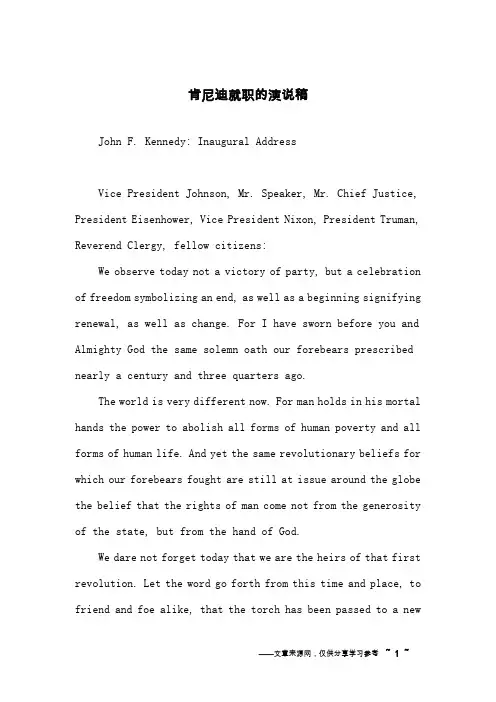
肯尼迪就职的演说稿John F. Kennedy: Inaugural AddressVice President Johnson, Mr. Speaker, Mr. Chief Justice, President Eisenhower, Vice President Nixon, President Truman, Reverend Clergy, fellow citizens:We observe today not a victory of party, but a celebration of freedom symbolizing an end, as well as a beginning signifying renewal, as well as change. For I have sworn before you and Almighty God the same solemn oath our forebears prescribed nearly a century and three quarters ago.The world is very different now. For man holds in his mortal hands the power to abolish all forms of human poverty and all forms of human life. And yet the same revolutionary beliefs for which our forebears fought are still at issue around the globe the belief that the rights of man come not from the generosity of the state, but from the hand of God.We dare not forget today that we are the heirs of that first revolution. Let the word go forth from this time and place, to friend and foe alike, that the torch has been passed to a newgeneration of Americans born in this century, tempered by war, disciplined by a hard and bitter peace, proud of our ancient heritage, and unwilling to witness or permit the slow undoing of those human rights to which this nation has always been committed, and to which we are committed today at home and around the world.Let every nation know, whether it wishes us well or ill, that we shall pay any price, bear any burden, meet any hardship, support any friend, oppose any foe, to assure the survival and the success of liberty.This much we pledge -- and more.To those old allies whose cultural and spiritual origins we share, we pledge the loyalty of faithful friends. United there is little we cannot do in a host of cooperative ventures. Divided there is little we can do for we dare not meet a powerful challenge at odds and split asunder.To those new states whom we welcome to the ranks of the free, we pledge our word that one form of colonial control shall not have passed away merely to be replaced by a far more iron tyranny. We shall not always expect to find them supporting our view. But we shall always hope to find them strongly supporting their own freedom and to remember that, in the past, those whofoolishly sought power by riding the back of the tiger ended up inside.。
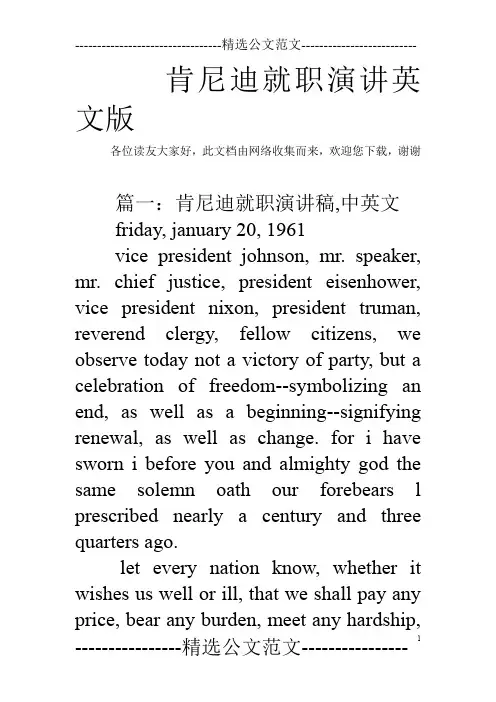
肯尼迪就职演讲英文版各位读友大家好,此文档由网络收集而来,欢迎您下载,谢谢篇一:肯尼迪就职演讲稿,中英文friday, january 20, 1961vice president johnson, mr. speaker, mr. chief justice, president eisenhower, vice president nixon, president truman, reverend clergy, fellow citizens, we observe today not a victory of party, but a celebration of freedom--symbolizing an end, as well as a beginning--signifying renewal, as well as change. for i have sworn i before you and almighty god the same solemn oath our forebears l prescribed nearly a century and three quarters ago.let every nation know, whether it wishes us well or ill, that we shall pay any price, bear any burden, meet any hardship,support any friend, oppose any foe, in order to assure the survival and the success of liberty.this much we pledge--and more.to those old allies whose cultural and spiritual origins we share, we pledge the loyalty of faithful friends. united, there is little we cannot do in a host of cooperative ventures. divided, there is little we can do--for we dare not meet a powerful challenge at odds and split asunder.past, those who foolishly sought power by riding the back of the tiger ended up inside.finally, to those nations who would make themselves our adversary, we offer not a pledge but a request: that both sides begin anew the quest for peace, before the dark powers of destruction unleashed by science engulf all humanity in planned or accidental self-destruction.we dare not tempt them withweakness. for only when our arms are sufficient beyond doubt can we be certain beyond doubt that they will never be employed.so let us begin anew--remembering on both sides that civility is not a sign of weakness, and sincerity is always subject to proof. let us never negotiate out of fear. but let us never fear to negotiate.let both sides explore what problems unite us instead of belaboring those problems which divide us.all this will not be finished in the first 100 days. nor will it be finished in the first 1,000 days, nor in the life of this administration, nor even perhaps in our lifetime on this planet. but let us begin.in your hands, my fellow citizens, more than in mine, will rest the final success or failure of our course. since this country was founded, each generation of americans has been summoned to givetestimony to its national loyalty. the graves of young americans who answered the call to service surround the globe.can we forge against these enemies a grand and global alliance, north and south, east and west, that can assure a more fruitful life for all mankind? will you join in that historic effort?and so, my fellow americans: ask not what your country can do for you--ask what you can do for your country.my fellow citizens of the world: ask not what america will do for you, but what together we can do for the freedom of man.finally, whether you are citizens of america or citizens of the world, ask of us the same high standards of strength and sacrifice which we ask of you. with a good conscience our only sure reward, with history the final judge of our deeds, let us go forth to lead the land we love, askinghis blessing and his help, but knowing that here on earth gods work must truly be our own.约翰-肯尼迪就职演讲星期五,1961年1月20日首席法官先生、艾森豪威尔总统、尼克松副总统、杜鲁门总统、尊敬的牧师、各位公民:今天我们庆祝的不是政党的胜利,而是自由的胜利。
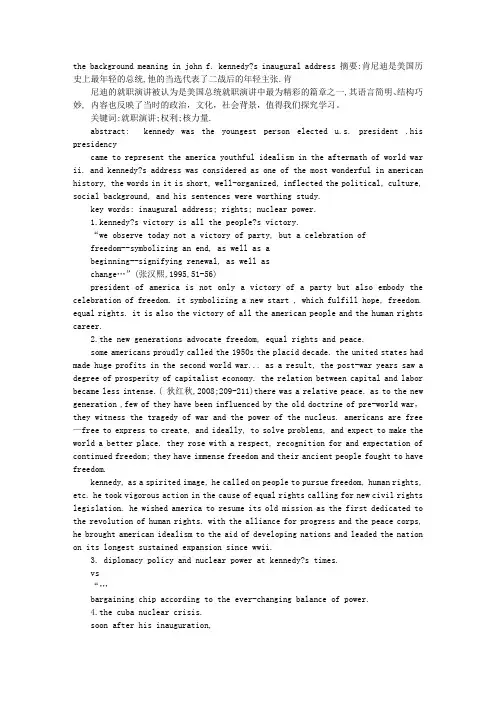
the background meaning in john f. kennedy?s inaugural address 摘要:肯尼迪是美国历史上最年轻的总统,他的当选代表了二战后的年轻主张.肯尼迪的就职演讲被认为是美国总统就职演讲中最为精彩的篇章之一,其语言简明、结构巧妙, 内容也反映了当时的政治,文化,社会背景,值得我们探究学习。
关键词:就职演讲;权利;核力量. abstract: kennedy was the youngest person elected u.s. president .hispresidencycame to represent the america youthful idealism in the aftermath of world warii. and kennedy?s address was considered as one of the most wonderful in americanhistory, the words in it is short, well-organized, inflected the political, culture,social background, and his sentences were worthing study. key words: inaugural address; rights; nuclear power.1.kennedy?s victory is all the people?s victory.“we observe today not a victory of party, but a celebration of freedom--symbolizing an end, as well as a beginning--signifying renewal, as well as change…”(张汉熙,1995,51-56) president of america is not only a victory of a party but also embody thecelebration of freedom. it symbolizing a new start , which fulfill hope, freedom.equal rights. it is also the victory of all the american people and the human rightscareer.2.the new generations advocate freedom, equal rights and peace. some americans proudly called the 1950s the placid decade. the united states hadmade huge profits in the second world war... as a result, the post-war years saw adegree of prosperity of capitalist economy. the relation between capital and laborbecame less intense.( 狄红秋,2008;209-211)there was a relative peace. as to the newgeneration ,few of they have been influenced by the old doctrine of pre-world war,they witness the tragedy of war and the power of the nucleus. americans are free—free to express to create, and ideally, to solve problems, and expect to make theworld a better place. they rose with a respect, recognition for and expectation ofcontinued freedom; they have immense freedom and their ancient people fought to havefreedom.kennedy, as a spirited image, he called on people to pursue freedom, human rights,etc. he took vigorous action in the cause of equal rights calling for new civil rightslegislation. he wished america to resume its old mission as the first dedicated tothe revolution of human rights. with the alliance for progress and the peace corps,he brought american idealism to the aid of developing nations and leaded the nationon its longest sustained expansion since wwii.3. diplomacy policy and nuclear power at kennedy?s times. vs “…bargaining chip according to the ever-changing balance of power.4.the cuba nuclear crisis. soon after his inauguration,russians tried to install nuclear missiles in cuba. when this was discovered in october 1962.kennedy imposed quarantine on al offensive weapons bound for cuba. while the world trembled on the brink of nuclear war, the russians backed down and agreed to take he missiles away… the months after the cuba crisis showed significant progress towardkennedy?s goal of “a world of law and free choice, banishing the world of war andcoercion”. his administration thus saw the beginning of new hope for both the equalrights of americans and the peace of the world.6. massive holy bible languages were used in the address. although kennedy?s address was given to the whole world, as to the people of english countries who mostly is christian and believe in the god, he quoted many sentences in the bible. perhaps he thought that such language style would arouse the sense of agreement among english countries, or on the other hand, maybe this is because kennedy believes in catholicism. and people always suspect whether he can fulfill his responsibility impartially or not, because he is a catholic. in order to reply this, in september of 1960,kennedy said he was not catholic candidate forpresident; he was the democratic partys candidate for president who happens also tobe a catholic. and he was not speaking for his church on public matters—and the churchdoes not speak for him. and kennedy also stressed there are many other things whichis much more important than religion. war, hunger, ignorance and despair have noreligion limit, and we should use religion tolerance to serve the national well-being.his speech restrained the noisy sound surrounding his religion issues. biography:[1]狄红秋. celebration hall: presidents of the u.s.a.[ m ].天津:天津大学出版社,2008,209-211.[2]李志坤et al. 《肯尼迪就职演说词的语用含义探究》[j/ol]. cjfd收录刊, 科技信息(学术研究) 2007年 09期,3.[3]张汉熙et al. 《高级英语》[ m ].北京:外语教学与研究出版社,1995,51-56. 篇二:肯尼迪就职演说评析阅读翻译注释首席法官先生,艾森豪威尔威尔总统,尼克松副总统,杜鲁门总统,尊敬的神父,同胞们;我们今天庆祝的不是一次政党的胜利而是庆祝自由精神的胜利 - 这不仅象征结束–这还象征开始–意味着更新–也意味着变革。
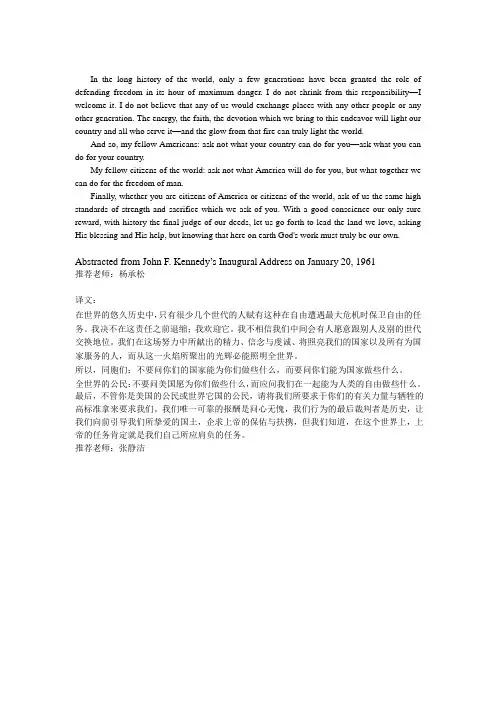
In the long history of the world, only a few generations have been granted the role of defending freedom in its hour of maximum danger. I do not shrink from this responsibility—I welcome it. I do not believe that any of us would exchange places with any other people or any other generation. The energy, the faith, the devotion which we bring to this endeavor will light our country and all who serve it—and the glow from that fire can truly light the world.And so, my fellow Americans: ask not what your country can do for you—ask what you can do for your country.My fellow citizens of the world: ask not what America will do for you, but what together we can do for the freedom of man.Finally, whether you are citizens of America or citizens of the world, ask of us the same high standards of strength and sacrifice which we ask of you. With a good conscience our only sure reward, with history the final judge of our deeds, let us go forth to lead the land we love, asking His blessing and His help, but knowing that here on earth God's work must truly be our own.Abstracted from John F. Kennedy’s Inaugural Address on January 20, 1961推荐老师:杨承松译文:在世界的悠久历史中,只有很少几个世代的人赋有这种在自由遭遇最大危机时保卫自由的任务。
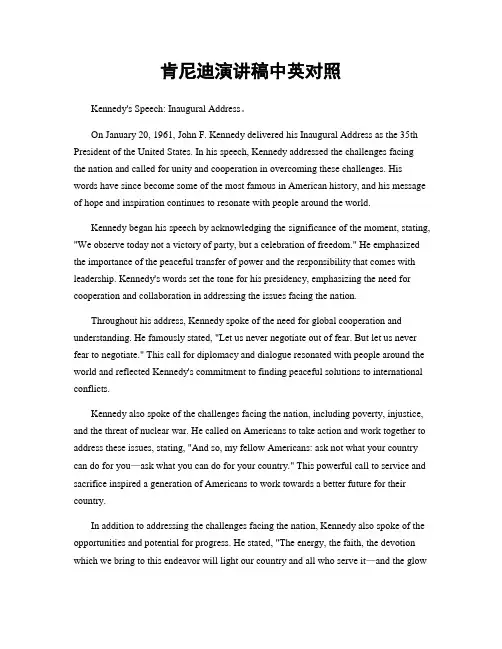
肯尼迪演讲稿中英对照Kennedy's Speech: Inaugural Address。
On January 20, 1961, John F. Kennedy delivered his Inaugural Address as the 35th President of the United States. In his speech, Kennedy addressed the challenges facing the nation and called for unity and cooperation in overcoming these challenges. His words have since become some of the most famous in American history, and his message of hope and inspiration continues to resonate with people around the world.Kennedy began his speech by acknowledging the significance of the moment, stating, "We observe today not a victory of party, but a celebration of freedom." He emphasized the importance of the peaceful transfer of power and the responsibility that comes with leadership. Kennedy's words set the tone for his presidency, emphasizing the need for cooperation and collaboration in addressing the issues facing the nation.Throughout his address, Kennedy spoke of the need for global cooperation and understanding. He famously stated, "Let us never negotiate out of fear. But let us never fear to negotiate." This call for diplomacy and dialogue resonated with people around the world and reflected Kennedy's commitment to finding peaceful solutions to international conflicts.Kennedy also spoke of the challenges facing the nation, including poverty, injustice, and the threat of nuclear war. He called on Americans to take action and work together to address these issues, stating, "And so, my fellow Americans: ask not what your country can do for you—ask what you can do for your country." This powerful call to service and sacrifice inspired a generation of Americans to work towards a better future for their country.In addition to addressing the challenges facing the nation, Kennedy also spoke of the opportunities and potential for progress. He stated, "The energy, the faith, the devotion which we bring to this endeavor will light our country and all who serve it—and the glowfrom that fire can truly light the world." Kennedy's words conveyed a sense of optimism and hope, inspiring people to believe in the possibility of a better future.Kennedy's Inaugural Address has become one of the most famous speeches in American history, and its message continues to resonate with people around the world. His call for unity, cooperation, and service has inspired generations of Americans to work towards a better future for their country. As we reflect on Kennedy's words, we are reminded of the power of leadership and the importance of working together to overcome the challenges we face. Kennedy's legacy continues to inspire us to strive for a world of peace, justice, and progress.。

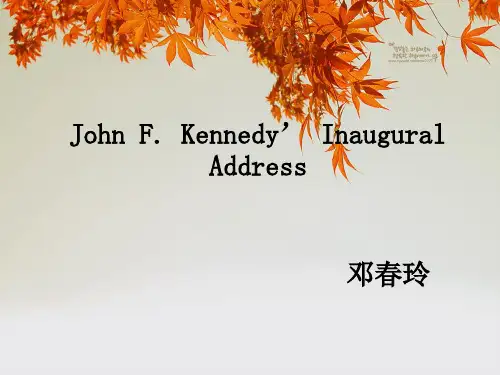
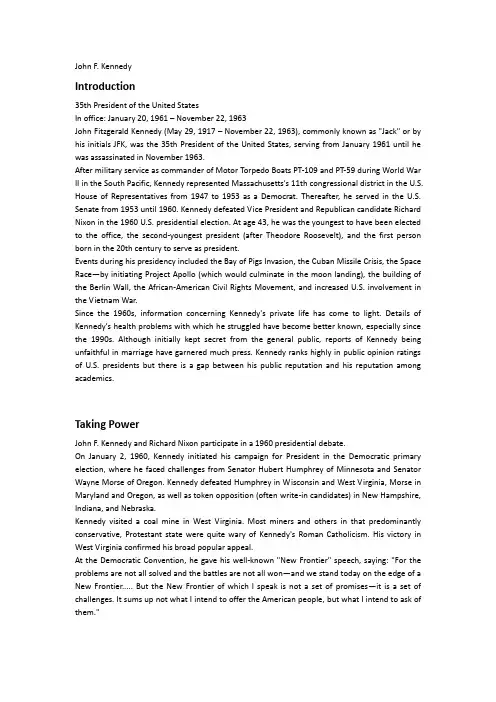
John F. KennedyIntroduction35th President of the United StatesIn office: January 20, 1961 – November 22, 1963John Fitzgerald Kennedy (May 29, 1917 – November 22, 1963), commonly known as "Jack" or by his initials JFK, was the 35th President of the United States, serving from January 1961 until he was assassinated in November 1963.After military service as commander of Motor Torpedo Boats PT-109 and PT-59 during World War II in the South Pacific, Kennedy represented Massachusetts's 11th congressional district in the U.S. House of Representatives from 1947 to 1953 as a Democrat. Thereafter, he served in the U.S. Senate from 1953 until 1960. Kennedy defeated Vice President and Republican candidate Richard Nixon in the 1960 U.S. presidential election. At age 43, he was the youngest to have been elected to the office, the second-youngest president (after Theodore Roosevelt), and the first person born in the 20th century to serve as president.Events during his presidency included the Bay of Pigs Invasion, the Cuban Missile Crisis, the Space Race—by initiating Project Apollo (which would culminate in the moon landing), the building of the Berlin Wall, the African-American Civil Rights Movement, and increased U.S. involvement in the Vietnam War.Since the 1960s, information concerning Kennedy's private life has come to light. Details of Kennedy's health problems with which he struggled have become better known, especially since the 1990s. Although initially kept secret from the general public, reports of Kennedy being unfaithful in marriage have garnered much press. Kennedy ranks highly in public opinion ratings of U.S. presidents but there is a gap between his public reputation and his reputation among academics.Taking PowerJohn F. Kennedy and Richard Nixon participate in a 1960 presidential debate.On January 2, 1960, Kennedy initiated his campaign for President in the Democratic primary election, where he faced challenges from Senator Hubert Humphrey of Minnesota and Senator Wayne Morse of Oregon. Kennedy defeated Humphrey in Wisconsin and West Virginia, Morse in Maryland and Oregon, as well as token opposition (often write-in candidates) in New Hampshire, Indiana, and Nebraska.Kennedy visited a coal mine in West Virginia. Most miners and others in that predominantly conservative, Protestant state were quite wary of Kennedy's Roman Catholicism. His victory in West Virginia confirmed his broad popular appeal.At the Democratic Convention, he gave his well-known "New Frontier" speech, saying: "For the problems are not all solved and the battles are not all won—and we stand today on the edge of a New Frontier..... But the New Frontier of which I speak is not a set of promises—it is a set of challenges. It sums up not what I intend to offer the American people, but what I intend to ask of them."Jackie with Jack campaigning in Appleton, Wisconsin, March 1960.With Humphrey and Morse eliminated, Kennedy's main opponent at the Los Angeles convention was Senator Lyndon B. Johnson of Texas. Kennedy overcame this formal challenge as well as informal ones from Adlai Stevenson, the Democratic nominee in 1952 and 1956, Stuart Symington, and several favorite sons, and on July 13 the Democratic convention nominated Kennedy as its candidate. Kennedy asked Johnson to be his Vice Presidential candidate, despite opposition from many liberal delegates and Kennedy's own staff, including his brother, Bobby. Kennedy needed Johnson's strength in the South to win what was considered likely to be the closest election since 1916. Major issues included how to get the economy moving again, Kennedy's Roman Catholicism, Cuba, and whether the Soviet space and missile programs had surpassed those of the U.S. To address fears that his being Catholic would impact his decision-making, he famously told the Greater Houston Ministerial Association on September 12, 1960, "I am not the Catholic candidate for President. I am the Democratic Party candidate for President who also happens to be a Catholic. I do not speak for my Church on public matters –and the Church does not speak for me." Kennedy questioned rhetorically whether one-quarter of Americans were relegated to second-class citizenship just because they were Catholic, and once stated that, "No one asked me my religion [serving the Navy] in the South Pacific."In September and October, Kennedy appeared with Republican candidate Richard Nixon, then Vice President, in the first televised U.S. presidential debates in U.S. history. During these programs, Nixon, with a sore injured leg and his "five o'clock shadow", was perspiring and looked tense and uncomfortable, while Kennedy, choosing to avail himself of makeup services, appeared relaxed, leading the huge television audience to favor Kennedy as the winner. Radio listeners either thought Nixon had won or that the debates were a draw.[48] The debates are now considered a milestone in American political history—the point at which the medium of television began to play a dominant role in politics.[36]President Dwight D. Eisenhower meets with President-elect John F. Kennedy on December 6, 1960Kennedy's campaign gained momentum after the first debate, and he pulled slightly ahead of Nixon in most polls. On November 8, Kennedy defeated Nixon in one of the closest presidential elections of the 20th century. In the national popular vote Kennedy led Nixon by just two-tenths of one percent (49.7% to 49.5%), while in the Electoral College he won 303 votes to Nixon's 219 (269 were needed to win).Another 14 electors from Mississippi and Alabama refused to support Kennedy because of his support for the civil rights movement; they voted for Senator Harry F. Byrd of Virginia, as did the elector from Oklahoma. Kennedy was the youngest man elected president, succeeding Eisenhower, who was then the oldest (Ronald Reagan surpassed Eisenhower as the oldest president in 1981).John F. Kennedy's Inaugural AddressJohn F. Kennedy takes the oath of office administered by Chief Justice Earl Warren on January 20, 1961, at the CapitolJohn F. Kennedy was sworn in as the 35th President at noon on January 20, 1961. In his inaugural address he spoke of the need for all Americans to be active citizens, famously saying, "Ask not what your country can do for you; ask what you can do for your country." He asked the nations of the world to join together to fight what he called the "common enemies of man: tyranny, poverty, disease, and war itself".He added: "All this will not be finished in the first one hundred days. Nor will it be finished in the first one thousand days, nor in the life of this Administration, nor even perhaps in our lifetime on this planet. But let us begin." In closing, he expanded on his desire for greater internationalism: "Finally, whether you are citizens of America or citizens of the world, ask of us here the same high standards of strength and sacrifice which we ask of you."We choose to go to the Moon in this decade and do the other things, not because they are easy, but because they are hard; because that goal will serve to organize and measure the best of our energies and skills; because that challenge is one that we are willing to accept, one we are unwilling to postpone, and one which we intend to win ...It is for these reasons that I regard the decision last year to shift our efforts in space from low to high gear as among the most important decisions that will be made during my incumbency in the office of the Presidency. - JFK, 1962The address reflected Kennedy's confidence that his administration would chart an historically significant course in both domestic policy and foreign affairs. The contrast between this optimistic vision and the pressures of managing daily political realities at home and abroad would be one of the main tensions running through the early years of his administration.Foreign PolicyForeign trips of John F. Kennedy during his presidencyPresident Kennedy's foreign policy was dominated by American confrontations with the Soviet Union, manifested by proxy contests in the early stage of the Cold War. In 1961, Kennedy anxiously anticipated a summit with Soviet Premier Nikita Khrushchev. The President started off on the wrong foot by reacting aggressively to a routine Khrushchev speech on Cold War confrontation in early 1961. The speech was intended for domestic audiences in the Soviet Union, but Kennedy interpreted it as a personal challenge. His mistake helped raise tensions going into the Vienna Summit of June 1961.On the way to the summit, Kennedy stopped in Paris to meet Charles de Gaulle, who advised Kennedy to ignore Khrushchev's abrasive style. The French president was nationalistic and disdainful of the United States' presumed influence in Europe. Nevertheless, de Gaulle was quite impressed with the young president and his family. Kennedy picked up on this in his speech in Paris, saying that he would be remembered as "the man who accompanied Jackie Kennedy to Paris."Kwame Nkrumah, the first head of an independent Ghana, with Kennedy, March 1961On June 4, 1961, the president met with Khrushchev in Vienna and left the meetings angry and disappointed that he had allowed the Premier to bully him, despite the warnings he had received. Khrushchev, for his part, was impressed with the president's intelligence, but thought him weak. Kennedy did succeed in conveying the bottom line to Khrushchev on the most sensitive issue before them, a proposed treaty between Moscow and East Berlin. He made it clear that any such treaty which interfered with U.S access rights in West Berlin would be regarded as an act of war.Shortly after the president returned home, the U.S.S.R. announced its intention to sign a treaty with East Berlin, abrogating any third-party occupation rights in either sector of the city. Kennedy, depressed and angry, assumed that his only option was to prepare the country for nuclear war, which he personally thought had a one-in-five chance of occurring.In the weeks immediately after the Vienna summit, more than 20,000 people fled from East Berlin to the western sector in reaction to statements from the USSR. Kennedy began intensive meetings on the Berlin issue, where Dean Acheson took the lead in recommending a military buildup alongside NATO allies. In a July 1961 speech, Kennedy announced his decision to add $3.25 billion to the defense budget, along with over 200,000 additional troops, stating that an attack on West Berlin would be taken as an attack on the U.S. The speech received an 85% approval rating.The following month, the Soviet Union and East Berlin began blocking any further passage of East Berliners into West Berlin and erected barbed wire fences across the city, which were quickly upgraded to the Berlin Wall. Kennedy's initial reaction was to ignore this, as long as free access from West to East Berlin continued. This course was altered when it was learned that the West Berliners had lost confidence in the defense of their position by the United States. Kennedy sent Vice President Johnson, along with a host of military personnel, in convoy through West Germany, including Soviet-armed checkpoints, to demonstrate the continued commitment of the U.S. to West Berlin.Kennedy gave a speech at Saint Anselm College on May 5, 1960, regarding America's conduct in the emerging Cold War. The address detailed how American foreign policy should be conducted towards African nations, noting a hint of support for modern African nationalism by saying that "For we, too, founded a new nation on revolt from colonial rule".Kennedy delivering his speech in West BerlinJFK's Ich bin ein Berliner speechIn 1963, Germany was enduring a time of particular vulnerability due to Soviet aggression to the east, de Gaulle's French nationalism to the west, and the impending retirement of West German Chancellor Adenauer. On June 26 Kennedy gave a public speech in West Berlin reiterating the American commitment to Germany and criticizing communism. He was met with an ecstatic response from a massive audience.Kennedy used the construction of the Berlin Wall as an example of the failures of communism: "Freedom has many difficulties, and democracy is not perfect. But we have never had to put a wall up to keep our people in, to prevent them from leaving us." The speech is known for itsfamous phrase "Ich bin ein Berliner" ("I am a citizen of Berlin"). A million people were on the street for the speech. He remarked to Ted Sorensen afterwards: "We'll never have another day like this one, as long as we live."EconomyKennedy ended a period of tight fiscal policies, loosening monetary policy to keep interest rates down and encourage growth of the economy. He presided over the first government budget to top the $100 billion mark, in 1962, and his first budget in 1961 led to the country's first non-war, non-recession deficit. The economy, which had been through two recessions in three years and was in one when Kennedy took office, accelerated notably during his presidency. Despite low inflation and interest rates, GDP had grown by an average of only 2.2% per annum during the Eisenhower presidency (scarcely more than population growth at the time), and had declined by 1% during Eisenhower's last twelve months in office.The economy turned around and prospered during the Kennedy administration. GDP expanded by an average of 5.5% from early 1961 to late 1963, while inflation remained steady at around 1% and unemployment eased. Industrial production rose by 15% and motor vehicle sales rose by 40%. This rate of growth in GDP and industry continued until around 1969, and has yet to be repeated for such a sustained period of time.Space Race and Space policyKennedy proposing a program to land men on the Moon to Congress in May 1961.The Apollo program was conceived early in 1960, during the Eisenhower administration, as a follow-up to Project Mercury. While NASA went ahead with planning for Apollo, funding for the program was far from certain, given Eisenhower's opposition to manned spaceflight. Kennedy's advisors speculated that a Moon flight would be prohibitively expensive, but he postponed the decision.Kennedy had appointed Vice President Johnson as chairman of the U.S. Space Council, a strong supporter of the US space program who had worked for the creation of NASA in the Senate. In Kennedy's January 1961 State of the Union address, Kennedy had suggested international cooperation in space. Khrushchev declined, as the Soviets did not wish to reveal the status of their rocketry and space capabilities.On April 12, 1961, Soviet cosmonaut Yuri Gagarin became the first person to fly in space, reinforcing American fears about being left behind in a technological competition with the Soviet Union.[228] Kennedy was eager for the U.S. to take the lead in the Space Race for reasons of strategy and prestige. He first announced the goal of landing a man on the Moon in the speech to a Joint Session of Congress on May 25, 1961, stating:"First, I believe that this nation should commit itself to achieving the goal, before this decade is out, of landing a man on the Moon and returning him safely to the Earth. No single space project in this period will be more impressive to mankind, or more important for the long-rangeexploration of space; and none will be so difficult or expensive to accomplish."[229] Full textKennedy made a speech at Rice University on September 12, 1962, in which he said:"No nation which expects to be the leader of other nations can expect to stay behind in this race for space. ... We choose to go to the Moon in this decade and do the other things, not because they are easy, but because they are hard."On November 21, 1962, in a cabinet meeting with NASA administrator James E. Webb and other officials, Kennedy explained that the Moon shot was important for reasons of international prestige, and that the expense was justified. Johnson assured him that lessons learned from the space program had military value as well. Costs for the Apollo program were expected to reach $40 billion.In a September 1963 speech before the United Nations, Kennedy urged cooperation between the Soviets and Americans in space, specifically recommending that Apollo be switched to "a joint expedition to the moon". Khrushchev again declined, and the Soviets did not commit to a manned Moon mission until 1964.[234] On July 20, 1969, almost six years after Kennedy's death, Apollo 11 landed the first manned spacecraft on the Moon.AssassinationAssassination of John F. KennedyPresident Kennedy was assassinated in Dallas, Texas, at 12:30 pm Central Standard Time on Friday November 22, 1963, while on a political trip to Texas to smooth over frictions in the Democratic Party between liberals Ralph Yarborough and Don Yarborough (no relation) and conservative John Connally. He was shot once in the throat, once in the upper back, with the fatal shot hitting him in the head.Kennedy was taken to Parkland Hospital for emergency medical treatment, but pronounced dead at 1:00 pm. Only 46, President Kennedy died younger than any U.S. president to date. Lee Harvey Oswald, an employee of the Texas School Book Depository from which the shots were suspected to have been fired, was arrested for the murder of a local police officer, and was subsequently charged with the assassination of Kennedy. He denied shooting anyone, claiming he was a patsy, but was killed by Jack Ruby on November 24, before he could be indicted or tried. Ruby was then arrested and convicted for the murder of Oswald. Ruby successfully appealed his conviction and death sentence but became ill and died of cancer on January 3, 1967, while the date for his new trial was being set.President Johnson created the Warren Commission—chaired by Chief Justice Earl Warren—to investigate the assassination, which concluded that Oswald was the lone assassin. The results of this investigation are disputed by many. The assassination proved to be an important moment in U.S. history because of its impact on the nation and the ensuing political repercussions. A 2004 Fox News poll found that 66% of Americans thought there had been a conspiracy to kill President Kennedy, while 74% thought there had been a cover-up. A Gallup Poll in mid-November 2013,showed 61% believed in a conspiracy, and only 30% thought Oswald did it alone.Vietnam WarThe US Special Forces had a special bond with Kennedy. "It was President Kennedy who was responsible for the rebuilding of the Special Forces and giving us back our Green Beret," said Forrest Lindley, a writer for the US military newspaper Stars and Stripes who served with Special Forces in Vietnam. This bond was shown at JFK's funeral. At the commemoration of the 25th anniversary of JFK's death, Gen. Michael D. Healy, the last commander of Special Forces in Vietnam, spoke at Arlington Cemetery. Later, a wreath in the form of the Green Beret would be placed on the grave, continuing a tradition that began the day of his funeral when a sergeant in charge of a detail of Special Forces men guarding the grave placed his beret on the coffin. Kennedy was the first of six Presidents to have served in the U.S. Navy, and one of the enduring legacies of his administration was the creation in 1961 of another special forces command, the Navy SEALs, which Kennedy enthusiastically supported.Ultimately, the death of President Kennedy and the ensuing confusion surrounding the facts of his assassination are of political and historical importance insofar as they marked a turning point and decline in the faith of the American people in the political establishment—a point made by commentators from Gore Vidal to Arthur M. Schlesinger, Jr. and implied by Oliver Stone in several of his films, such as his landmark 1991 JFK.Although President Kennedy opposed segregation and had shown support for the civil rights of African Americans, he originally believed in a more measured approach to legislation given the political realities he faced in Congress, especially with the Southern Conservatives. However, impelled by the civil rights demonstrations of Martin Luther King, Kennedy in 1963 proposed legislative action. In a radio and TV address to the nation in June 1963—a century after President Abraham Lincoln had signed the Emancipation Proclamation—Kennedy became the first president to call on all Americans to denounce racism as morally wrong. Kennedy's civil rights proposals led to the Civil Rights Act of 1964.President Lyndon B. Johnson, Kennedy's successor, took up the mantle and pushed the landmark Civil Rights Act through a bitterly divided Congress by invoking the slain president's memory. President Johnson then signed the Act into law on July 2, 1964. This civil rights law ended what was known as the "Solid South" and certain provisions were modeled after the Civil Rights Act of 1875, signed into law by President Ulysses S. Grant.Kennedy's continuation of Presidents Harry S. Truman and Dwight D. Eisenhower's policies of giving economic and military aid to South Vietnam left the door open for President Johnson's escalation of the conflict. At the time of Kennedy's death, no final policy decision had been made as to Vietnam, leading historians, cabinet members and writers to continue to disagree on whether the Vietnam conflict would have escalated to the point it did had he survived. His agreement to the NSAM 263 action of withdrawing 1,000 troops by the end of 1963, and his earlier 1963 speech at American University, suggested he was ready to end the Vietnam War. The Vietnam War contributed greatly to a decade of national difficulties, amid violent disappointment on the political landscape.Many of Kennedy's speeches (especially his inaugural address) are considered iconic; and despitehis relatively short term in office and lack of major legislative changes coming to fruition during his term, Americans regularly vote him as one of the best presidents, in the same league as Abraham Lincoln, George Washington, and Franklin D. Roosevelt. Some excerpts of Kennedy's inaugural address are engraved on a plaque at his grave at Arlington.Ask Not What Your Country Can Do For You speechInaugural Address by John F. Kennedy - January 20th 1961On a frigid Winter's day, January 20, 1961, John Fitzgerald Kennedy took the oath of office as the 35th President of the United States. At age 43, he was the youngest man and the first Roman Catholic ever elected. He had won by one of the smallest margins of victory, only 115,000 popular votes. This is the speech he delivered announcing the dawn of a new era as young Americans born in the 20th century first assumed leadership of the Nation.Ask Not What Your Country Can Do For You speechVice President Johnson, Mr. Speaker, Mr. Chief Justice, President Eisenhower, Vice President Nixon, President Truman, reverend clergy, fellow citizens, we observe today not a victory of party, but a celebration of freedom - symbolizing an end, as well as a beginning - signifying renewal, as well as change. For I have sworn before you and Almighty God the same solemn oath our forebears prescribed nearly a century and three quarters ago.The world is very different now. For man holds in his mortal hands the power to abolish all forms of human poverty and all forms of human life. And yet the same revolutionary beliefs for which our forebears fought are still at issue around the globe - the belief that the rights of man come not from the generosity of the state, but from the hand of God.We dare not forget today that we are the heirs of that first revolution. Let the word go forth from this time and place, to friend and foe alike, that the torch has been passed to a new generation of Americans - born in this century, tempered by war, disciplined by a hard and bitter peace, proud of our ancient heritage - and unwilling to witness or permit the slow undoing of those human rights to which this Nation has always been committed, and to which we are committed today at home and around the world.Let every nation know, whether it wishes us well or ill, that we shall pay any price, bear any burden, meet any hardship, support any friend, oppose any foe, in order to assure the survival and the success of liberty.This much we pledge - and more.To those old allies whose cultural and spiritual origins we share, we pledge the loyalty of faithful friends. United, there is little we cannot do in a host of cooperative ventures. Divided, there is little we can do - for we dare not meet a powerful challenge at odds and split asunder.To those new States whom we welcome to the ranks of the free, we pledge our word that one form of colonial control shall not have passed away merely to be replaced by a far more iron tyranny. We shall not always expect to find them supporting our view. But we shall always hope to find them strongly supporting their own freedom - and to remember that, in the past, those whofoolishly sought power by riding the back of the tiger ended up inside.To those peoples in the huts and villages across the globe struggling to break the bonds of mass misery, we pledge our best efforts to help them help themselves, for whatever period is required - not because the Communists may be doing it, not because we seek their votes, but because it is right. If a free society cannot help the many who are poor, it cannot save the few who are rich.To our sister republics south of our border, we offer a special pledge - to convert our good words into good deeds - in a new alliance for progress - to assist free men and free governments in casting off the chains of poverty. But this peaceful revolution of hope cannot become the prey of hostile powers. Let all our neighbours know that we shall join with them to oppose aggression or subversion anywhere in the Americas. And let every other power know that this Hemisphere intends to remain the master of its own house.To that world assembly of sovereign states, the United Nations, our last best hope in an age where the instruments of war have far outpaced the instruments of peace, we renew our pledge of support - to prevent it from becoming merely a forum for invective - to strengthen its shield of the new and the weak - and to enlarge the area in which its writ may run.Finally, to those nations who would make themselves our adversary, we offer not a pledge but a request: that both sides begin anew the quest for peace, before the dark powers of destruction unleashed by science engulf all humanity in planned or accidental self-destruction.We dare not tempt them with weakness. For only when our arms are sufficient beyond doubt can we be certain beyond doubt that they will never be employed.But neither can two great and powerful groups of nations take comfort from our present course - both sides overburdened by the cost of modern weapons, both rightly alarmed by the steady spread of the deadly atom, yet both racing to alter that uncertain balance of terror that stays the hand of mankind's final war.So let us begin anew - remembering on both sides that civility is not a sign of weakness, and sincerity is always subject to proof. Let us never negotiate out of fear. But let us never fear to negotiate.Let both sides explore what problems unite us instead of belabouring those problems which divide us.Let both sides, for the first time, formulate serious and precise proposals for the inspection and control of arms - and bring the absolute power to destroy other nations under the absolute control of all nations.Let both sides seek to invoke the wonders of science instead of its terrors. Together let us。
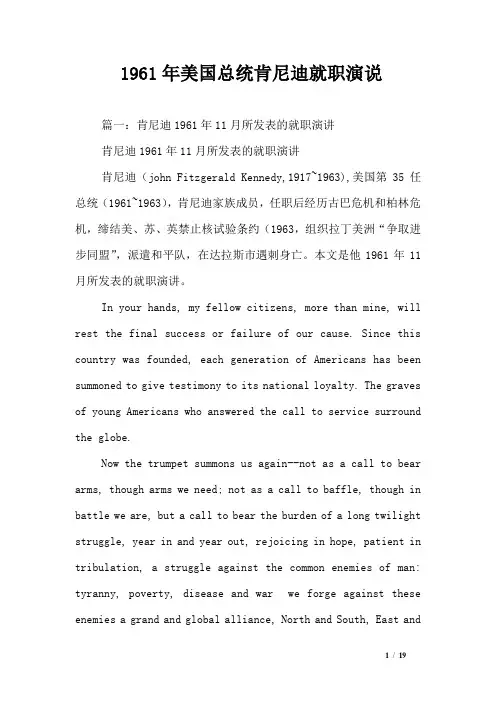
1961年美国总统肯尼迪就职演说篇一:肯尼迪1961年11月所发表的就职演讲肯尼迪1961年11月所发表的就职演讲肯尼迪(john Fitzgerald Kennedy,1917~1963),美国第35任总统(1961~1963),肯尼迪家族成员,任职后经历古巴危机和柏林危机,缔结美、苏、英禁止核试验条约(1963,组织拉丁美洲“争取进步同盟”,派遣和平队,在达拉斯市遇刺身亡。
本文是他1961年11月所发表的就职演讲。
In your hands, my fellow citizens, more than mine, will rest the final success or failure of our cause. Since this country was founded, each generation of Americans has been summoned to give testimony to its national loyalty. The graves of young Americans who answered the call to service surround the globe.Now the trumpet summons us again--not as a call to bear arms, though arms we need; not as a call to baffle, though in battle we are, but a call to bear the burden of a long twilight struggle, year in and year out, rejoicing in hope, patient in tribulation, a struggle against the common enemies of man: tyranny, poverty, disease and war we forge against these enemies a grand and global alliance, North and South, East andWest, that can assure a more fruitful life for all mankind? Will you join in that historic effort?In the long history of the world, only a few generations have been granted the role of defending freedom in its hour of maximum danger. I do not shrink from this responsibility--I welcome it. I do not believe that any of us would exchange places with any other people or any other generation. The energy, the faith, the devotion which we bring to this endeavor will light our country and all who serve it--and the glow from that fire can truly light the world.And so, my fellow Americans: ask not what your country can do for you--ask what you can do for your country.My fellow citizens of the world: ask not what America will do for you, but what together we can do for the freedom of man.Finally, whether you are citizens of America or citizens of the world ask of us here the same high standards of strength and sacrifice which we ask of you. With a good conscience our only sure reward, with history the final judge of our deeds, let us go forth to lead the land we love, asking His blessing and His help, but knowing that here on earth God’s work must truly be our own.summon 召唤trumpet 喇叭,号角bear 携带:配带twilight a黄昏的,黎明的tribulation 苦难,磨难fruitful 富有成效的肯尼迪1961年11月所发表的就职演讲公民们,我们事业的最终成败与其说掌握在我手中,不如说掌握在你们手中。
肯尼迪就职演说 Inaugural Addressjohn f. kennedyinaugural addressdelivered 20 january 1961vice president johnson, mr. speaker, mr. chief justice, president eisenhower, vice president nixon, president truman, reverend clergy, fellow citizens: we observe today not a victory of party, but a celebration of freedom -- symbolizing an end, as well as a beginning -- signifying renewal, as well as change. for i have sworn before you and almighty god the same solemn oath our forebears prescribed nearly a century and three-quarters ago.the world is very different now. for man holds in his mortal hands the power to abolish all forms of human poverty and all forms of human life. and yet the same revolutionary beliefs for which our forebears fought are still at issue around the globe -- the belief that the rights of man come not from the generosity of the state, but from the hand of god.we dare not forget today that we are the heirs ofthat first revolution. let the word go forth from this time and place, to friend and foe alike, that the torch has been passed to a new generation of americans -- born in this century, tempered by war, disciplined by a hard and bitter peace, proud of our ancient heritage, and unwilling to witness or permit the slow undoing of those human rights to which this nation has always been committed, and to which we are committed today at home and around the world.let every nation know, whether it wishes us well or ill, that we shall pay any price, bear any burden, meet any hardship, support any friend, oppose any foe, to assure the survival and the success of liberty.this much we pledge -- and more.to those old allies whose cultural and spiritual origins we share, we pledge the loyalty of faithful friends. united there is little we cannot do in a host of cooperative ventures. divided there is little we can do -- for we dare not meet a powerful challenge at odds and split asunder.to those new states whom we welcome to the ranks of the free, we pledge our word that one form of colonialcontrol shall not have passed away merely to be replaced by a far more iron tyranny. we shall not always expect to find them supporting our view. but we shall always hope to find them strongly supporting their own freedom -- and to remember that, in the past, those who foolishly sought power by riding the back of the tiger ended up inside.to those people in the huts and villages of half the globe struggling to break the bonds of mass misery, we pledge our best efforts to help them help themselves, for whatever period is required -- not because the communists may be doing it, not because we seek their votes, but because it is right. if a free society cannot help the many who are poor, it cannot save the few who are rich.to our sister republics south of our border, we offer a special pledge: to convert our good words into good deeds, in a new alliance for progress, to assist free men and free governments in casting off the chains of poverty. but this peaceful revolution of hope cannot become the prey of hostile powers. let all our neighbors know that we shall join with them to oppose aggressionor subversion anywhere in the americas. and let every other power know that this hemisphere intends to remain the master of its own house.to that world assembly of sovereign states, the united nations, our last best hope in an age where the instruments of war have far outpaced the instruments of peace, we renew our pledge of support -- to prevent it from becoming merely a forum for invective, to strengthen its shield of the new and the weak, and to enlarge the area in which its writ may run.finally, to those nations who would make themselves our adversary, we offer not a pledge but a request: that both sides begin anew the quest for peace, before the dark powers of destruction unleashed by science engulf all humanity in planned or accidental self-destruction.we dare not tempt them with weakness. for only when our arms are sufficient beyond doubt can we be certain beyond doubt that they will never be employed.but neither can two great and powerful groups of nations take comfort from our present course -- both sides overburdened by the cost of modern weapons, both rightly alarmed by the steady spread of the deadly atom,yet both racing to alter that uncertain balance of terror that stays the hand of mankind’s final war.so let us begin anew -- remembering on both sides that civility is not a sign of weakness, and sincerity is always subject to proof. let us never negotiate out of fear, but let us never fear to negotiate.let both sides explore what problems unite us instead of belaboring those problems which divide us.let both sides, for the first time, formulate serious and precise proposals for the inspection and control of arms, and bring the absolute power to destroy other nations under the absolute control of all nations.let both sides seek to invoke the wonders of science instead of its terrors. together let us explore the stars, conquer the deserts, eradicate disease, tap the ocean depths, and encourage the arts and commerce.let both sides unite to heed, in all corners of the earth, the command of isaiah -- to “undo the heavy burdens, and [to] let the oppressed go free.”¹ and, if a beachhead of cooperation may push back the jungle of suspicion, let both sides join in creating a new endeavor -- not a new balance of power, but a newworld of law -- where the strong are just, and the weak secure, and the peace preserved.all this will not be finished in the first one hundred days. nor will it be finished in the first one thousand days; nor in the life of this administration; nor even perhaps in our lifetime on this planet. but let us begin.in your hands, my fellow citizens, more than mine, will rest the final success or failure of our course. since this country was founded, each generation of americans has been summoned to give testimony to its national loyalty. the graves of young americans who answered the call to service surround the globe.now the trumpet summons us again -- not as a call to bear arms, though arms we need -- not as a call to battle, though embattled we are -- but a call to bear the burden of a long twilight struggle, year in and year out, “rejoicing in hope; patient in tribulation,”²a struggle against the common enemies of man: tyranny, poverty, disease, and war itself.can we forge against these enemies a grand and global alliance, north and south, east and west, thatcan assure a more fruitful life for all mankind? will you join in that historic effort?in the long history of the world, only a few generations have been granted the role of defending freedom in its hour of maximum danger. i do not shrink from this responsibility -- i welcome it. i do not believe that any of us would exchange places with any other people or any other generation. the energy, the faith, the devotion which we bring to this endeavor will light our country and all who serve it. and the glow from that fire can truly light the world.and so, my fellow americans, ask not what your country can do for you; ask what you can do for your country.my fellow citizens of the world, ask not what america will do for you, but what together we can do for the freedom of man.finally, whether you are citizens of america or citizens of the world, ask of us here the same high standards of strength and sacrifice which we ask of you. with a good conscience our only sure reward, with history the final judge of our deeds, let us go forthto lead the land we love, asking his blessing and his help, but knowing that here on earth god’s work must truly be our own.。
InauguralAddress肯尼迪就职演说修辞总结[五篇范文]第一篇:Inaugural Address肯尼迪就职演说修辞总结synecdoche / si'nekdəki /:substituting a more inclusive term for a less inclusive one or vice versaInaugural Address肯尼迪就职演说修辞总结美国总统肯尼迪的就职演说辞沿袭古希腊,罗马的修辞及文风精心选用语言句式,注意音韵效果,字字句句经过刻意雕琢。
一、Alliteration是一种常见的反复类音韵修辞格,恰当使用Alliteration能赋予语言以音韵美和节奏美,起到演染气氛烘托感情加强语言表现力等效果, 如:• Let the word go forth.....that the torch has been passed to a new generation of Americans.“(para3)• In order to assure the survival and the success of liberty …• Let both sides seek to invoke the wonders of science instead of its terrors.Together let us explore the stars, conquer the deserts, eradicate disease, tap the ocean depths, and encourage the arts and commerce.(para17)• …both rightly alarmed by the steady spread of the deadly atom(para13)二、UnderstatementUnderstatement的修辞功能在肯尼迪这篇演说辞中”首先体现在它是一种政界辞令“整篇文章”没有直截了当地对国际形势进行分析“ 更没有一处提到一个国家的名字或具体事例”一切都隐晦委婉模糊不清"例如三、1.We dare not tempt them with weakness.For only when our arms are sufficient beyond doubt can we be certain beyond doubt that they will never be employed.(我们不敢以怯弱来引诱他们因为只有当我们毫无疑问地拥有足够的军事装备时我们才能真正有把握地确信永远不会使用武力)para12一场规模空前的军备竞赛的动因被说成了We dare not tempt them with weakness.Understatement的运用变主动为被动变张牙舞爪为委曲求全2.United there is little we cannot do in a host of cooperative ventures.Divided there is little we can do for we dare not meet a powerful challenge at odds and split asunder.para6(团结,将使我们在许多合作事业中无往而不胜,分裂,我们将一事无成)三、parallelism(平行结构)parallelism是将结构相同或相似,意义并重语气一致的语言成分、短语、句子乃至语段等并行排列的一种修辞手法,这种辞格可以使语言简洁明了,结构精致对称,声调铿锵有力、叙事生动逼真语意鲜明突出。
First Inaugural Address 肯尼迪总统就职演说We observe today not a victory of party, but a celebration of freedom, symbolizing an end, as well as a beginning; signifying renewal, as well as change. For I have sworn before you and Almighty God the same solemn oath our forebears prescribed nearly a century and three quarters ago.今天我们庆祝的不是政党的胜利,而是自由的胜利。
这象征着一个结束,也象征着一个开端;意味着延续也意味看变革。
因为我已在你们和全能的上帝面前,宣读了我们的先辈在170多年前拟定的庄严誓言。
In your hands, my fellow citizens, more than in mine, will rest the final successor failure of our course. Since this country was founded, each generation of Americans has been summoned to give testimony to its national loyalty. The graves of young Americans who answered the call to service surround the globe. 公民们,我们方针的最终成败与其说掌握在我手中,不如说掌握在你们手中。
自从合众国建立以来,每一代美国人都曾受到召唤去证明他们对国家的忠诚。
响应召唤而献身的美国青年的坟墓遍及全球。
Now the trumpet summons us again, not as a call to bear arms, though arms we need; not as a call to battle, though embattled we are; but a call to bear the burden of a long twilight struggle, year in and year out, "rejoicing in hope; patient in tribulation",a struggle against the common enemies of man: tyranny, poverty, disease, and war itself.现在,号角已再次吹响---不是召唤我们拿起武器,虽然我们需要武器;不是召唤我们去作战,虽然我们严阵以待。
肯尼迪总统就职演说英文版On January 20, 1961, John Fitzgerald Kennedy was inaugurated as the 35th President of the United States of America. This event marked the beginning of a new era in American history and signaled a transition toward a more idealistic and hopeful vision for the country's future. Kennedy's inaugural address, delivered on that day, remains one of the most memorable and influential speeches in American history.Kennedy's speech was the culmination of months of preparation and consultation with his team of advisors and speechwriters. Prior to the inauguration, he had spent hours working on his speech, practicing his delivery, and refining its message. The result was a powerful and evocative address that captured the spirit of the moment and laid out a bold vision for the future.The speech began with Kennedy's famous line, "Ask not what your country can do for you, ask what you can do for your country." This phrase would become one of the most enduring and iconic statements in American political history. It epitomized Kennedy's belief in the importance of civic duty, responsibility, and sacrifice, and underscored his commitment to a more engaged and active citizenry.The rest of the speech was equally inspiring, with Kennedy outlining his vision for America's future both at home and abroad. He spoke of the need to confront the challenges of poverty, racism, and inequality head-on, and to work toward a more just and equitable society. He also emphasized the importance of U.S. leadership on the global stage, calling for a renewed commitment to diplomacy, cooperation, and peace.As Kennedy spoke, his words resonated deeply with the American people, who were hungry for a new vision and a new direction. In the wake of the Cold War and the political and social upheavals of the 1950s, Kennedy's message of hope, idealism, and optimism struck a chord. He represented a break from the old politics of division and fear, and a new era of cooperation and progress.Over the years, Kennedy's inaugural address has become a touchstone for generations of Americans, serving as a symbol of America's commitment to justice, equality, and freedom. Its message of personal responsibility, sacrifice, and hard work continues to inspire and energize people both in the U.S. and around the world, encouraging them to see themselves as builders and creators of a better future.In the end, Kennedy's speech was more than just a call to action. It was a rallying cry for a new generation of Americans, a signpost pointing the way to a better, more inclusive, and more equitable future for all. And though Kennedy himself did not liveto see that future come to pass, his legacy lives on, inspiring countless others to take up the torch and carry forward his vision of a brighter tomorrow.。